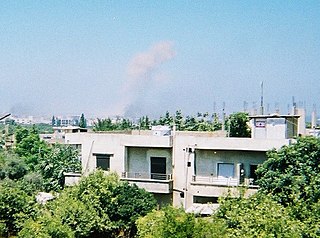Related Research Articles

The Lebanese Armed Forces, also known as the Lebanese Army, is the military of the Lebanese Republic. It consists of three branches, the ground forces, the air force, and the navy. The motto of the Lebanese Armed Forces is "Honor, Sacrifice, Loyalty".

Ansar al-Islam in Kurdistan, simply called Ansar al-Islam, is a Kurdish Islamist militant and separatist group. It was established in northern Iraq around the Kurdistan Region by Kurdish Islamists who were former Taliban and former Al-Qaeda volunteers, which were coming back from Afghanistan in 2001 after the Fall of Kabul. Its motive is to establish an Islamic state around the Kurdistan region and to protect Kurdish people from other armed insurgent groups. It imposed strict Sharia in villages it controlled around Byara near the Iranian border. Its ideology follows a traditionalist interpretation of the Quran and Salafism.
Jund al-Sham is or was the name of multiple Sunni Islamic jihadist militant groups.
Ain al-Hilweh, also spelled as Ayn al-Hilweh and Ein al-Hilweh, is the largest Palestinian refugee camp in Lebanon. It had a population of over 70,000 Palestinian refugees but swelled to nearly 120,000, as a result of influx of refugees from Syria since 2011. The camp is located west of the village Miye ou Miye and the Mieh Mieh refugee camp, southeast of the port city of Sidon and north of Darb Es Sim.
Osbat al-Ansar or Asbat an-Ansar is a Sunni fundamentalist group established in the early 1990s, with a primary base of operations in the Palestinian camp of Ain al-Hilweh refugee camp near Sidon, which claims professing the Salafi form of Islam and the overthrow of the Lebanese-dominated secular government.
Ahmed Abd al-Karim al-Saadi aka Abu Mohjen is a Palestinian who became the leader of Osbat al-Ansar in 1991 after founder Sheik Hisham Shreidi was killed by Fatah rivals. Abu Mohjen is believed to have been behind the transformation of Osbat al-Ansar from a Palestinian-centered militant group into an al-Qaeda supported pan-Islamic organization.

Fadel Abdul Rahman Shamander Chaker is a Lebanese and Palestinian singer and actor born in Sidon, Lebanon. During his musical career he was signed to Al Khouyoul Records and from 2003 onwards with Rotana Records.

Fatah al-Islam is a radical Sunni Islamist group that formed in November 2006 in a Palestinian refugee camp, located in Lebanon. It has been described as a militant jihadist movement that draws inspiration from al-Qaeda. It became well known in 2007 after engaging in combat against the Lebanese Army in the Nahr al-Bared UNRWA Palestinian refugee camp. Following its defeat at Nahr el-Bared, the group relocated to the Ain al-Hilweh refugee camp near Sidon in 2008. As of 2014, after the death or capture of many members, most of the surviving members of Fatah al-Islam are thought to have joined other groups in Lebanon and Syria including the Free Syrian Army, Al-Nusra Front, Ahrar al-Sham, and the Islamic State of Iraq and the Levant.

The 2007 Lebanon conflict began when fighting broke out between Fatah al-Islam, an Islamist militant organization, and the Lebanese Armed Forces (LAF) on May 20, 2007 in Nahr al-Bared, a UNRWA Palestinian refugee camp near Tripoli.

This is a detailed timeline of the 2007 Lebanon conflict.

The Abdullah Azzam Brigades, or al-Qaeda in Lebanon, is a Sunni Islamist militant group, and al-Qaeda's branch in Lebanon. The group, which began operating in 2009, was founded by Saudi Saleh Al-Qaraawi and has networks in various countries, mainly in Egypt, Iraq, Syria, Jordan, the Gaza Strip and Lebanon.

The Army of the Men of the Naqshbandi Order, also called the Naqshbandi Army, is one of a number of underground Ba'athist and Sufi militant insurgency groups fighting U.S.-led Coalition forces in Iraq. Media frequently refers to the group by the initials JRTN, a romanization of its Arabic name. Supreme Command for Jihad and Liberation, technically the name of the umbrella organisation to which JRTN belongs, is also often used to refer to JRTN specifically.
Palestinians in Lebanon include the Palestinian refugees who fled to Lebanon during the 1948 Palestine War, their descendants, the Palestinian militias which resided in Lebanon in the 1970s and 1980s, and Palestinian nationals who moved to Lebanon from countries experiencing conflict, such as Syria. There are roughly 3,000 registered Palestinians and their descendants who hold no identification cards, including refugees of the 1967 Naksa. Many Palestinians in Lebanon are refugees and their descendants, who have been barred from naturalisation, retaining stateless refugee status. However, some Palestinians, mostly Christian women, have received Lebanese citizenship, in some cases through marriage with Lebanese nationals.

Between 2011 and 2017, fighting from the Syrian civil war spilled over into Lebanon as opponents and supporters of the Syrian Arab Republic traveled to Lebanon to fight and attack each other on Lebanese soil. The Syrian conflict stoked a resurgence of sectarian violence in Lebanon, with many of Lebanon's Sunni Muslims supporting the rebels in Syria, while many of Lebanon's Shi'a Muslims supporting the Ba'athist government of Bashar Al-Assad, whose Alawite minority is usually described as a heterodox offshoot of Shi'ism. Killings, unrest and sectarian kidnappings across Lebanon resulted.
Al-Shirqat is a town west of the Tigris in Saladin Governorate, Iraq, located 294 kilometres northwest of Baghdad. It is the main town of the Al-Shirqat District, and is near the ruins of the ancient Assyrian city of Assur.
The following lists events in the year 2017 in Lebanon.
Events in the year 2023 in Lebanon.
On 30 July 2023, fighting broke out inside the Ain al-Hilweh Palestinian refugee camp in Lebanon after Islamist gunmen tried to assassinate Fatah militant Mahmoud Khalil, killing a companion of his instead.
References
- ↑ Rabil, Robert G. (2014). Salafism in Lebanon: From Apoliticism to Transnational Jihadism. Georgetown University Press. p. 144. ISBN 978-1-62616-116-0.
- ↑ Arab, The New (2016-09-22). "Lebanon arrests suspected Islamic State group 'emir'". https://www.newarab.com/ . Retrieved 2024-01-07.
{{cite web}}: External link in|website= - ↑ "Lebanese military court sentences Daesh official to 160 years in prison". Arab News PK. 2023-09-27. Retrieved 2024-01-07.
- ↑ "Lebanese security forces arrest ISIS Emir in Lebanon". Al-Masdar News. Archived from the original on 16 November 2018. Retrieved 22 September 2016.